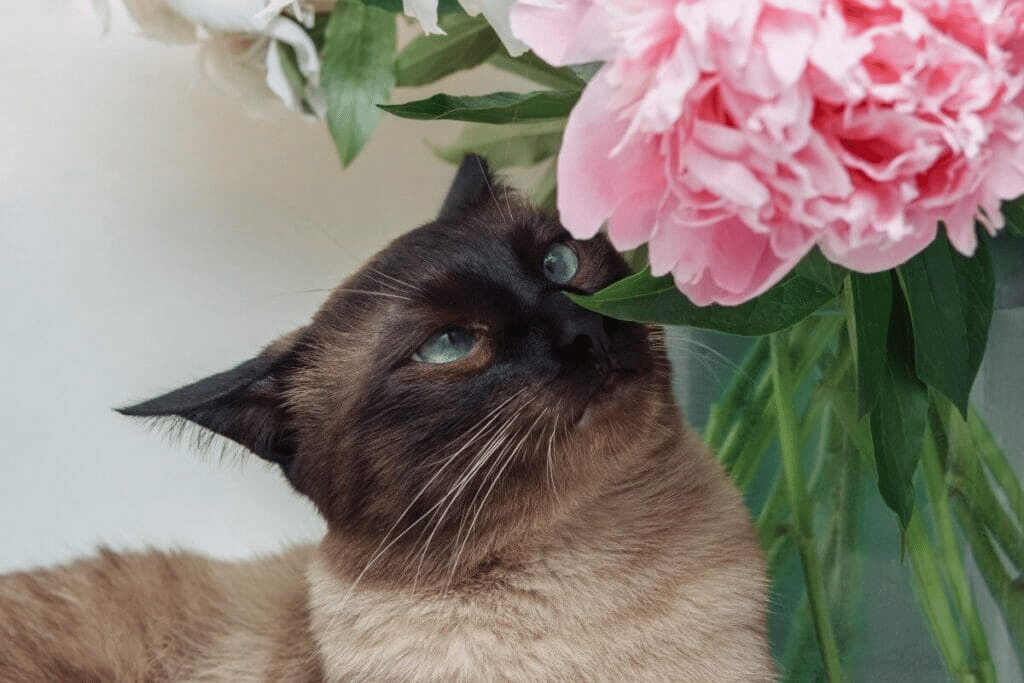Hey there, pet parents! If you’re a cat lover and a fan of beautiful blooms, you might be wondering about the safety of peonies around your feline friends. Are peonies poisonous to cats? In this article, we’ll dive into the world of peonies and explore whether these gorgeous flowers can pose a risk to your curious kitties.
Peonies are beloved for their lush petals and vibrant colors, making them a popular choice for gardens and floral arrangements. However, their beauty hides a potential danger for cats. We’ll uncover the truth about peonies and their toxicity levels, as well as practical tips to keep your cats safe and your floral displays stunning.
So, if you’ve ever asked yourself, “Are peonies poisonous to cats?” – stick around! We’re about to uncover the answers and help you navigate the world of floral safety for your furry companions. Let’s get started!
Recommended article: Are Hydrangeas Poisonous to Cats?
Toxic Components in Peonies

Peonies, known for their lush blooms and fragrant scent, contain toxic substances that can be harmful to cats if ingested. The main toxic components in peonies are paeonol and paeoniflorin, which can cause gastrointestinal upset in cats. These substances are found in varying concentrations throughout the plant, with higher concentrations typically in the roots and stems.
It’s important to note that while peonies are considered mildly poisonous to cats. Severe poisoning is rare and most cases result in mild symptoms. However, it’s always best to err on the side of caution and take preventive measures to keep your cat safe.
Recommended article: Are Carnations Toxic To Cats?
Symptoms of Peonies Poisoning in Cats
Here are the key symptoms of peonies poisoning in cats to look out for:
- Vomiting: Cats may experience vomiting after ingesting peonies. This can occur shortly after ingestion and may be accompanied by other symptoms.
- Diarrhea: Another common symptom of peony poisoning in cats is diarrhea. This can be mild to severe and may persist for some time after ingestion.
- Drooling: Excessive drooling can occur in cats that have ingested peonies. This is often a sign of gastrointestinal upset and may be accompanied by other symptoms.
- Mild Skin Irritation: Some cats may develop mild skin irritation after coming into contact with peonies. This can manifest as redness, itching, or irritation of the skin.
It’s important to note that most cases of peony poisoning in cats are mild and typically do not lead to serious complications. However, if your cat experiences any of these symptoms after ingesting peonies, it’s important to monitor them closely and seek veterinary care if the symptoms persist or worsen. Early intervention can help prevent any potential complications and ensure your cat receives the appropriate treatment.
Recommended article: List Of Cat Safe Flowers
What To Do If My Cat Ingests Peonies
If you suspect that your cat has ingested poisonous peonies, it’s important to take immediate action to ensure their safety. Here’s what you can do:
- Assess the Situation: If you witness your cat consuming peonies or notice any signs of ingestion, such as chewed leaves or petals, gather as much information as possible about the quantity and parts of the plant ingested.
- Contact a Veterinarian: Call your veterinarian or an emergency veterinary clinic immediately. Provide them with details about the ingestion, including the type of plant, the amount ingested, and any symptoms your cat may be experiencing.
- Observe Your Cat: Monitor your cat closely for any signs of poisoning, such as vomiting, diarrhea, drooling, lethargy, or changes in behavior. Note the onset and progression of symptoms, as this information will be helpful for the veterinarian.
- Avoid Home Remedies: Do not attempt to induce vomiting or administer any home remedies without consulting a veterinarian first. Some home remedies can be harmful or ineffective, and the appropriate treatment will depend on the specific circumstances of the ingestion.
- Follow Veterinary Advice: Based on the severity of the ingestion and your cat’s symptoms, the veterinarian will recommend the appropriate course of action. This may include supportive care, such as intravenous fluids, medications to control symptoms, or hospitalization for observation and treatment.
- Prevent Future Ingestions: After seeking veterinary care, take steps to prevent future ingestions by keeping peonies and other potentially toxic plants out of reach of your cat. Consider using deterrents or alternative decorations that are safe for pets.
By acting quickly and seeking veterinary care, you can help ensure the best possible outcome for your cat if they ingest peonies or any other toxic plants.
Recommended article: List Of Cat Toxic Flowers
Prevention and Safety Measures
Here are some tips to prevent accidental ingestion and keep your feline friend safe:
- Keep Peonies Out of Reach: Place peonies in areas that are inaccessible to cats, such as high shelves or hanging baskets. This will prevent curious cats from nibbling on the flowers or leaves.
- Use Deterrents: If you have peonies as part of your floral arrangements, consider using pet-safe deterrents, such as bitter-tasting sprays or natural repellents, to discourage cats from approaching or chewing on the flowers.
- Supervise Indoor Floral Arrangements: When arranging flowers indoors, be mindful of where you place peonies and other potentially toxic plants. Keep them out of reach of cats and supervise your pet’s interactions with floral decorations.
- Educate Yourself and Others: Learn to recognize peonies and educate yourself about the signs of poisoning in cats. Share this information with family members, friends, and guests to ensure everyone is aware of the potential risks to pets.
- Create a Safe Indoor Environment: Provide your cat with a stimulating indoor environment that includes cat-friendly plants that are safe for consumption. This can help satisfy their natural urge to chew on plants without exposing them to toxic species like peonies.
By following these preventive measures and being aware of the potential dangers, you can help keep your cat safe from poisonous peonies. Remember, a little caution goes a long way in protecting your furry friend!
Recommended article: Is Rosemary Safe For Cats? Find out if Rosemary is Poisonous to Cats
Frequently Asked Questions
1. Are peonies poisonous to cats?
Yes, peonies are considered toxic to cats if ingested. The toxic compounds in peonies can cause gastrointestinal upset, including vomiting and diarrhea, in cats.
2. What parts of the peony plant are toxic to cats?
The entire peony plant, including the flowers, leaves, stems, and roots, contains toxic compounds that can be harmful to cats if ingested.
3. How toxic are peonies to cats?
Peonies are considered mildly toxic to cats. While ingestion may cause gastrointestinal upset, severe poisoning and serious complications are rare.
4. What are the symptoms of peony poisoning in cats?
Symptoms of peony poisoning in cats may include vomiting, diarrhea, drooling, and mild skin irritation. In severe cases, cats may experience difficulty breathing or collapse.
5. What should I do if my cat ingests peonies?
If you suspect that your cat has ingested peonies, contact your veterinarian immediately. They can provide guidance based on the severity of the ingestion and the symptoms your cat is experiencing.
Recommended article: 15 Cat Behaviors you didn’t know about
Conclusion
While peonies are beautiful flowers, they can be poisonous to cats if ingested. It’s important to be aware of the potential toxicity of peonies and take preventive measures to protect your feline friend.
By following the tips mentioned in this article, such as keeping peonies out of reach, using deterrents, and educating yourself about toxic plants, you can help ensure your cat stays safe. Remember, early recognition and prompt veterinary care are crucial if you suspect your cat has ingested peonies or is showing any signs of poisoning.
For more articles on pet care, behavior, health, grooming, breeding, and other topics related to keeping your cat happy and healthy, visit our website. Stay informed, stay proactive, and give your cat the best care possible!

